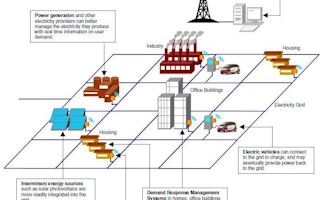Asian countries, led by China, are increasingly turning to smart grids to manage energy efficiency, and investment in energy distribution is growing in tandem.
Energy experts at the Clean Energy Expo Asia on Wednesday noted that smart grids have been steadily gaining attention in the global energy arena since the term was first introduced in the late 1990s.
These grids, a modern, more efficient version of the old electricity network, hold potential solutions to energy security and energy efficiency.
Their advantage over the traditional electricity networks stems from the use of comprehensive digital technology for power transmission and distribution management, say experts.
Smart grids steer energy to exactly where and when it is needed using smart meters and virtual power plants. This allows the network to provide the most efficient distribution of power. Suppliers can also influence consumer demand by charging different rates for electricity at peak or off-peak hours.
Michio Seita from Japan’s New Energy and Industrial Technology Development Organisation (NEDO) told Eco-Business that the biggest challenge for smart grids now is to integrate alternative energy sources into electricity networks while maintaining stable power supplies.
Dr Bartosz Wojszczyk, global smart grid technical leader at GE Energy, said that the benefits of smart grids broke down into four different areas – technical; business and operational; consumer; and environmental.
The actual benefits, however, will largely depend on the starting point, he added. Each project varies because of the legacy systems or existing infrastructure, and also because of regional circumstances.
Different parts of the world present different challenges relating to technology, business models and policies; and there is no dominant technological solution yet.
All these possibilities make smart grids an intriguing investment option with high expectations.
The global market for smart grids is predicted to boom from US$69.3 billion last year to US$171.4 billion by 2014, a growth of almost 150 per cent. According to a January report from research firm Zpryme, China alone is planning to invest over US$100 billion over the next 10 years to upgrade its power distribution.
However, experts could not agree who should pay for smart grids.
Jim Chisholm, executive general manager of Energy Sustainability at Ergon Energy, said that the market should pay for the infrastructure. Other panellists believed that smart grids should be funded by a combination of utility companies, energy producers, consumers and technology providers.
Eco-Business.com’s coverage of the Clean Energy Expo Asia 2010 is brought to you by Conchubar Capital Management.






















